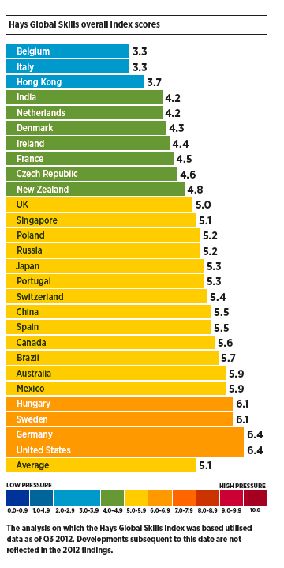|
| Tuesday, 27 November 2012, 14:00 HKT/SGT | |
| |  | |
Source: Hays | |
|
|
|
TOKYO, Nov 27, 2012 - (ACN Newswire) - Japan's economy faces an improving macroeconomic environment, but a lack of openness to immigration, combined with a strong talent mismatch means that employers may face an increasingly difficult time filling posts.
 | | Strong Talent Mismatch Intensifies Skills Shortage: Hays Global Skills Index |
This is the main finding of a major new report published by recruiting experts Hays and produced in collaboration with Oxford Economics. The Hays Global Skills Index 2012 represents a unique and insightful barometer of the market dynamics and availability of professional skills in 27 key economies around the world.
Overall Japan scores 5.3 on the Index, compared to the average of 5.1. The Hays Global Skills Index creates a score for each country between 0 and 10 on the constraints and frictions being faced by its market for skilled labour. This is calculated through an analysis of seven components, covering areas such as education levels, labour market flexibility, and high-skill wage pressures.
The Index shows that each country surveyed faces specific issues in its skilled labour force. 16 of the 27 countries are currently suffering some degree of labour market tightness, despite the global economic slowdown - an economic paradox.
A score above the mid-point of 5.0 suggests that employers are witnessing difficulties finding the key skills they need and are suffering market friction, whilst a score below 5.0 indicates a lax labour market in which there are no major constraints on the supply of skilled labour. Within these overall scores, however, the scores attributed to each of the seven components can vary significantly, highlighting the different dynamics and pressures faced.
Japan's talent mismatch is 8.1 on the Index, which is one of the highest for any country in the survey. Therefore, Japan needs to recruit skilled staff from the international market who can operate on the global stage, according to the report.
"Until recently Japan was able to recruit the staff it needed locally and could favour Japanese speakers," says Christine Wright, Operations Director of Asia for Hays.
"The culture of a job for life was very strong and there was a natural progression of qualified staff rising up through the ranks. But this has now changed and employers need to look further afield for the talent they need, particularly in those sectors or businesses that are expanding internationally."
Japan, which is emerging from two decades of weak performance, has a rapidly ageing population, according to the report.
"That has the double negative effect of increasing the demand for healthcare workers for the elderly while simultaneously reducing the supply of new entrants into the workforce. The increase in structural and long-term unemployment has created a mismatch between the available workforce and the more innovative skills that employers want," says Christine.
"Also, in Japan more people are going overseas to study to secure skills required by local employers. Unfortunately it is almost five years too late because employers need the people coming through the system now."
To combat the mismatch of skills availability and demand around the world, the Hays report proposes a long-term three-point action plan for policymakers. First, governments should focus on the skills their economies lack and take appropriate measures to attract the relevant people through targeted immigration. This would in many cases require an overhaul of existing work visa arrangements. Second, employers should be offered fiscal incentives to increase their provision of relevant training. Third, governments should work with employers and educational authorities to implement a series of measures and incentives to persuade young people to acquire the skills that are most needed on both a country and international level.
Meanwhile, Japan scores 6.8 on the Index in terms of the fragility of the economy. The report says Japan's government finances remain weak, while its exports have deteriorated in recent years. Growth is expected to remain about two per cent for the next few years; while modest, this is above the recent historic average.
The economy is operating with a substantial margin of low output, giving Japan a score of 6.8 on the health of the economy. There is some evidence of rising inflation - for an economy prone to deflation, this is a positive development, according to the report.
To see the full Hays Global Skills Index and report, please go to www.hays-index.com/
Hays, the world's leading recruiting experts in qualified, professional and skilled people.
Contact:
Keiko Asakura
Hays Japan
Marketing Manager
+81 3 3560 2813
Keiko.Asakura@hays.co.jp
Topic: Research / Industry Report
Source: Hays
https://www.acnnewswire.com
From the Asia Corporate News Network
Copyright © 2026 ACN Newswire. All rights reserved. A division of Asia Corporate News Network.
|
|
|
|

|
|
|
|